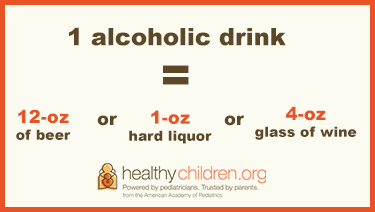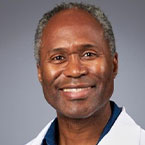By: Vincent C. Smith, MD, MPH, FAAP & Renee Turchi, MD, MPH, FAAP
If you're expecting a baby, it is important to avoid drinking alcohol. Read on to learn why, and find answers to common questions parents may have about drinking during pregnancy.
How does alcohol harm the developing fetus?
Alcohol is a "teratogen," something known to cause abnormalities in a fetus after prenatal exposure. Alcohol consumed by a pregnant person can reach the fetus and interfere with development of the brain and other body organs. A child exposed to alcohol before birth may face a lifetime of challenges from what are called fetal alcohol spectrum disorders.
What are fetal alcohol spectrum disorders (FASDs)?
The term
fetal alcohol spectrum disorders, or FASDs, describes a broad group of conditions that result from prenatal alcohol exposure. People with FASDs have a combination of physical, developmental, behavioral and learning challenges that range from mild to severe. Each person with an FASD has their own unique combination of signs and symptoms.
The term FASD includes all of the following conditions:
Fetal alcohol syndrome (FAS)
Partial fetal alcohol syndrome (pFAS)
Alcohol-related birth defects (ARBDs)
Alcohol-related neurodevelopmental disorder (ARND)
Neurobehavioral disorder associated with prenatal alcohol exposure (ND-PAE)
How common is prenatal alcohol exposure?
Children with prenatal alcohol exposure come from every social, economic, racial, and ethnic group. In the United States, nearly
1 in 7 pregnant people report alcohol use in the past 30 days.
How to prevent FASDs
FASDs are 100% preventable. The only sure way to prevent FASDs is to completely avoid alcohol use while pregnant. Because damage from prenatal alcohol exposure can occur even during the earliest weeks of pregnancy, often before someone realizes they are pregnant, people who are trying to get pregnant or who could get pregnant also should avoid alcohol.
There is
no amount of alcohol during pregnancy that is risk-free
There is
no kind of alcohol during pregnancy that is risk-free
There is
no time during pregnancy when alcohol consumption is risk-free
What is considered "a drink"?
 In the United States, a "standard drink" is defined for as any alcoholic beverage that contains 0.6 fluid ounces (14 g) of pure alcohol. In general, the means 12 oz of beer, 4 oz glass of wine, or 1 oz shot of hard liquor are each one standard drink. Mixed drinks or alcohol served in restaurants/bars often contain more than one standard drink.
In the United States, a "standard drink" is defined for as any alcoholic beverage that contains 0.6 fluid ounces (14 g) of pure alcohol. In general, the means 12 oz of beer, 4 oz glass of wine, or 1 oz shot of hard liquor are each one standard drink. Mixed drinks or alcohol served in restaurants/bars often contain more than one standard drink.
Is there any safe amount of alcohol consumption during pregnancy?
There is no safe amount of alcohol when a person is pregnant. Research evidence indicates that even drinking small amounts of alcohol while pregnant can lead to:
Does more drinking during pregnancy cause more harm?
The more alcohol a developing fetus is exposed to, the higher the risk is for the developing fetus to have alcohol-related brain and organ damage. Binge drinking (having four or more drinks at one time) is the worst pattern of drinking. However, even low to moderate amounts of alcohol can have adverse effects on the developing fetus's brain and organs. Thus, the best advice is to avoid prenatal alcohol exposure.
Is there any kind of alcohol that is safe to drink during pregnancy?
There is no safe type of alcoholic beverage to consume while pregnant. For example, red wine is no safer than white wine, beer, or mixed drinks, since all contain alcohol.
Is there a safe time during pregnancy when you can drink alcohol?
No, there is no point during pregnancy when drinking alcohol is considered safe. Harmful effects from alcohol can happen at the earliest stages of pregnancy to the developing fetal brain—even before someone realizes they are pregnant. Because different aspects of the child are developing at all stages of pregnancy, alcohol's effects on a developing baby can result from alcohol use at any point during pregnancy. Alcohol is a known neurotoxin and the brain develops throughout pregnancy, thus the developing brain and nervous system are always at risk.
Can a partner's use of alcohol lead to FASDs?
No, a partner's use of alcohol cannot lead to FASDs. FASDs can only happen when a pregnant person consumes alcohol. There is some literature that suggests a sperm produced by a partner who drinks alcohol can have changes (i.e. epigenetic alterations) that could affect the developing fetus, but this science is still in the earliest stages at this time. However, it is important for the father of the baby or the supportive partner to encourage the pregnant person to abstain from alcohol throughout the pregnancy.
What do I do if I did not know I was pregnant and have been drinking?
Stop drinking as soon as you find out you are pregnant. This is the best thing you can do for yourself and your baby. In general, babies born to expectant parents who stop drinking do better than babies of those who continue to drink alcohol. In addition, make sure you get regular prenatal checkups and discuss your alcohol use with your healthcare provider. Don't hesitate to ask for advice, especially if you think you might have difficulty stopping your use of alcohol. A wide variety of referrals and resources are available.
Please see below.
If I drank when I was pregnant, does that mean my baby will have an FASD?
Not necessarily, because every pregnancy is different. Which babies will be affected from prenatal alcohol exposure varies based on genetics, nutrition, environmental factors and exposure to other substances like cigarette smoking. It is hard to predict which babies will be affected and how severely they will be affected from prenatal exposure to alcohol. Discuss your FASD concerns with your child's health care provider and be sure to be honest about your alcohol usage. There is no blame or judgment, you just want to have your baby get the care they need.
Is it okay to drink alcohol if I am trying to get pregnant?
No, it is not okay to drink alcohol while trying to get pregnant. When someone is trying to get pregnant, they might already be pregnant and not know it for up to 4 to 6 weeks. This means that if they are drinking alcohol, they are also exposing their fetus to all the alcohol-related risks. They are also raising the risk for other adverse reproductive outcomes such as miscarriage. So, the best advice is to stop drinking when you start trying to get pregnant. See
Alcohol and Pregnancy: It's Just Not Worth the Risk.
Why should I worry about alcohol use if I am not pregnant and not trying to get pregnant?
Half of all pregnancies in the United States are unplanned. The best way to prevent unplanned pregnancies beyond abstinence is by consistently using effective
birth control.
Can my child get an FASD if I drink while breastfeeding?
No, because FASDs are the result of prenatal alcohol exposure. Still, it is a good idea to
limit alcohol consumption while providing breast milk to your baby because alcohol can pass through your milk to your baby. Remember, brain development continues after birth and occurs throughout childhood. Drinking beer does not increase your milk supply, as urban myth suggests. In fact, consuming alcohol of any kind may decrease the amount of milk your baby drinks. Alcohol can change the taste of your milk, and this may be objectionable to some babies.
If you are going to have an alcohol containing beverage, it is best to do so just after you nurse or pump milk rather than before. Breastfeeding or pumping breast milk is ok 4 hours after your last drink. That way, your body will have as much time as possible to rid itself of the alcohol before the next feeding and less will reach your infant.
There are concerns about long-term, repeated exposures of infants to alcohol via breast milk, so moderation is advised. Frequent consumption of alcohol may also reduce milk production.
How are FASDs diagnosed?
Diagnosing FASDs can be difficult because there is no single or simple test that can cover the broad range of FASD signs and symptoms. A pediatric medical home provider and/or other pediatric or developmental specialists usually make the FASD diagnosis after one or more appropriate evaluations. Be sure to ask your pediatrician if you are worried that your child may have an FASD and need further evaluation.
Certain physical findings, developmental problems, behavioral concerns, or school failure should trigger the parents and the pediatric medical home to consider FASDs as potential diagnoses. Children with an FASD can have brain abnormalities that lead to problems in day-to-day functioning despite having a normal IQ, so a comprehensive evaluation is indicated. Some common issues for children with FASDs are learning and memory impairment, poor self-regulation (including co-diagnosis of ADHD) and trouble with planning and organization.
Children with involvement in foster care or adoption processes―especially international adoptions―should always be evaluated for a possible FASD.
Is there a cure for FASDs?
FASDs last a lifetime. There is no cure for FASDs, but identifying children with FASDs as early as possible can help them reach their potential. Research has shown that early identification and enrollment in treatment can significantly improve an affected child's development and life.
Are there treatments that help with FASDs?
Treatments have been shown to help, but no one treatment is right for every child since one FASD differs from another. FASDs need a medical home to provide, coordinate, and facilitate all the necessary medical, behavioral, social and educational services.
Many types of FASD treatment are available, including:
Developmental services
Educational interventions
Behavior modification
Parent training
Social skills training
Medications and other medical therapies
Transition planning
Advocacy in school and the workplace
Referral for community support services
Coordination across the specialists, partners, and needed supports
Primary care in a high-quality medical home setting with care integration
Treatment plans should be adaptable to the child's and family's needs, plus include close monitoring and follow-up.
Are FASDs genetic or hereditary?
There is no evidence that FASDs are genetic or hereditary. FASDs can only happen if someone consumes alcohol while they are pregnant. A person who has an FASD does not have greater risk of having a child with an FASD unless they consume alcohol during their pregnancy.
However, individuals with FASDs are at increased risk for substance use and other secondary conditions associated with FASDs. For these reasons, someone who has an FASD themselves can indeed be at increased risk for having a child with an FASD.
What if my doctor tells me it is okay to drink during pregnancy?
Your doctor is not giving you advice based on the best and most recent research available. Every major medical organization in the United States, including the American Academy of Pediatrics, the American College of Obstetricians and Gynecologists, the American Academy of Family Physicians, the US Surgeon General, and the CDC, agree and consistently state that the best advice is for people not to drink alcohol while they are pregnant or trying to become pregnant.
There is
no amount of alcohol during pregnancy that is risk-free.
There is
no type of alcohol during pregnancy that is risk-free.
There is
no time during pregnancy when alcohol consumption is risk-free.
What if my biological child is diagnosed with an FASD?
Discuss all your questions and concerns with your child's medical home provider and other specialists caring for your child. You may need reassurance as a parent and benefit from greater personal and emotional support. There may be a support group to which your child's doctor can refer you, or you can find one through your community, church, or school system.
The FASD United has a
Circle of Hope/Birth Mother's Network that can be contacted in person or online.
Any continued alcohol use should be discussed regarding your own safety and that of future pregnancies.
I've tried in the past to stop drinking alcohol, but I just couldn't do it. Where can I get help?
If you cannot stop drinking, talk with your doctor or contact local Alcoholics Anonymous (AA) groups or a local alcohol counselor or treatment center. AA is a cost-free fellowship of men and women who share their experience, strength, and hope with each other that they may solve their common problem and help others to recover from alcohol use disorder. Locate an AA program near you by visiting
www.aa.org.
The Substance Abuse and Mental Health Services Administration (SAMHSA) has a treatment facility locator. This locator helps people find drug and alcohol use treatment programs in their area. Visit
https://findtreatment.gov/.
The FASD United Family Navigator program provides resources and services to individuals, family members, or caregivers living with alcohol or other substance use disorders. Visit https://fasdunited.org/family-navigator/ for more information.
What about marijuana and vaping during pregnancy?
The AAP also advises against using tobacco, e-cigarettes, marijuana, and other harmful substances during pregnancy:
No amount of marijuana has been proven safe to use during pregnancy or while breastfeeding.
No type of e-cigarette―also known as e-hookah, e-pens, vape pens, or tanks―is safe to use while pregnant or while breastfeeding. E-cigarettes are NOT a safe way to quit smoking during pregnancy either.
Where can I get more information about FASDs?
About Dr. Smith:
 Vincent C. Smith, MD, MPH, FAAP
is an associate director of the Neonatal Intensive Care Unit at Beth Israel Deaconess Medical Center (BIDMC) and a member of the Boston Children's Hospital Division of Newborn Medicine and an Assistant Professor of Pediatrics at Harvard Medical School. Within the American Academy of Pediatrics (AAP), Dr. Smith is the Medical Director for the Fetal Alcohol Spectrum Disorders (FASDs) program and author of several AAP clinical reports that address FASDs and the effects of prenatal substance exposure.
Vincent C. Smith, MD, MPH, FAAP
is an associate director of the Neonatal Intensive Care Unit at Beth Israel Deaconess Medical Center (BIDMC) and a member of the Boston Children's Hospital Division of Newborn Medicine and an Assistant Professor of Pediatrics at Harvard Medical School. Within the American Academy of Pediatrics (AAP), Dr. Smith is the Medical Director for the Fetal Alcohol Spectrum Disorders (FASDs) program and author of several AAP clinical reports that address FASDs and the effects of prenatal substance exposure.
|
About Dr. Turchi:
 Renee Turchi, MD, MPH, FAAP is the Section Chief of General Pediatrics and Medical Director of the Center for Children and Youth with Special Health Care Needs (CYSHCN) at St. Christopher's Hospital for Children in Philadelphia. At St. Christopher, she also oversees a primary care practice dedicated to CYSHCN, including an FASD/NICU primary care follow up program and grants. She is also the Medical Director of the Pennsylvania Medical Home Program and transition program. Within the American Academy of Pediatrics (AAP), Dr. Turchi is a member of Council on Children with Disabilities, the Section on Administration and Practice Management, and the Fetal Alcohol Syndrome Disorders Champions Network.
Renee Turchi, MD, MPH, FAAP is the Section Chief of General Pediatrics and Medical Director of the Center for Children and Youth with Special Health Care Needs (CYSHCN) at St. Christopher's Hospital for Children in Philadelphia. At St. Christopher, she also oversees a primary care practice dedicated to CYSHCN, including an FASD/NICU primary care follow up program and grants. She is also the Medical Director of the Pennsylvania Medical Home Program and transition program. Within the American Academy of Pediatrics (AAP), Dr. Turchi is a member of Council on Children with Disabilities, the Section on Administration and Practice Management, and the Fetal Alcohol Syndrome Disorders Champions Network.
|